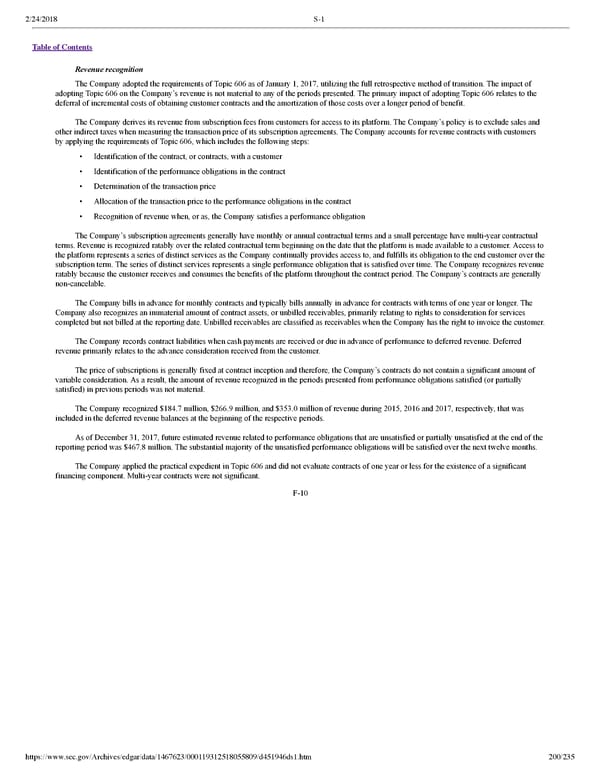2/24/2018 S-1 Table of Contents Revenue recognition The Company adopted the requirements of Topic 606 as of January 1, 2017, utilizing the full retrospective method of transition. The impact of adopting Topic 606 on the Company’s revenue is not material to any of the periods presented. The primary impact of adopting Topic 606 relates to the deferral of incremental costs of obtaining customer contracts and the amortization of those costs over a longer period of benefit. The Company derives its revenue from subscription fees from customers for access to its platform. The Company’s policy is to exclude sales and other indirect taxes when measuring the transaction price of its subscription agreements. The Company accounts for revenue contracts with customers by applying the requirements of Topic 606, which includes the following steps: • Identification of the contract, or contracts, with a customer • Identification of the performance obligations in the contract • Determination of the transaction price • Allocation of the transaction price to the performance obligations in the contract • Recognition of revenue when, or as, the Company satisfies a performance obligation The Company’s subscription agreements generally have monthly or annual contractual terms and a small percentage have multiyear contractual terms. Revenue is recognized ratably over the related contractual term beginning on the date that the platform is made available to a customer. Access to the platform represents a series of distinct services as the Company continually provides access to, and fulfills its obligation to the end customer over the subscription term. The series of distinct services represents a single performance obligation that is satisfied over time. The Company recognizes revenue ratably because the customer receives and consumes the benefits of the platform throughout the contract period. The Company’s contracts are generally noncancelable. The Company bills in advance for monthly contracts and typically bills annually in advance for contracts with terms of one year or longer. The Company also recognizes an immaterial amount of contract assets, or unbilled receivables, primarily relating to rights to consideration for services completed but not billed at the reporting date. Unbilled receivables are classified as receivables when the Company has the right to invoice the customer. The Company records contract liabilities when cash payments are received or due in advance of performance to deferred revenue. Deferred revenue primarily relates to the advance consideration received from the customer. The price of subscriptions is generally fixed at contract inception and therefore, the Company’s contracts do not contain a significant amount of variable consideration. As a result, the amount of revenue recognized in the periods presented from performance obligations satisfied (or partially satisfied) in previous periods was not material. The Company recognized $184.7 million, $266.9 million, and $353.0 million of revenue during 2015, 2016 and 2017, respectively, that was included in the deferred revenue balances at the beginning of the respective periods. As of December 31, 2017, future estimated revenue related to performance obligations that are unsatisfied or partially unsatisfied at the end of the reporting period was $467.8 million. The substantial majority of the unsatisfied performance obligations will be satisfied over the next twelve months. The Company applied the practical expedient in Topic 606 and did not evaluate contracts of one year or less for the existence of a significant financing component. Multiyear contracts were not significant. F10 https://www.sec.gov/Archives/edgar/data/1467623/000119312518055809/d451946ds1.htm 200/235
 Dropbox S-1 | Interactive Prospectus Page 199 Page 201
Dropbox S-1 | Interactive Prospectus Page 199 Page 201